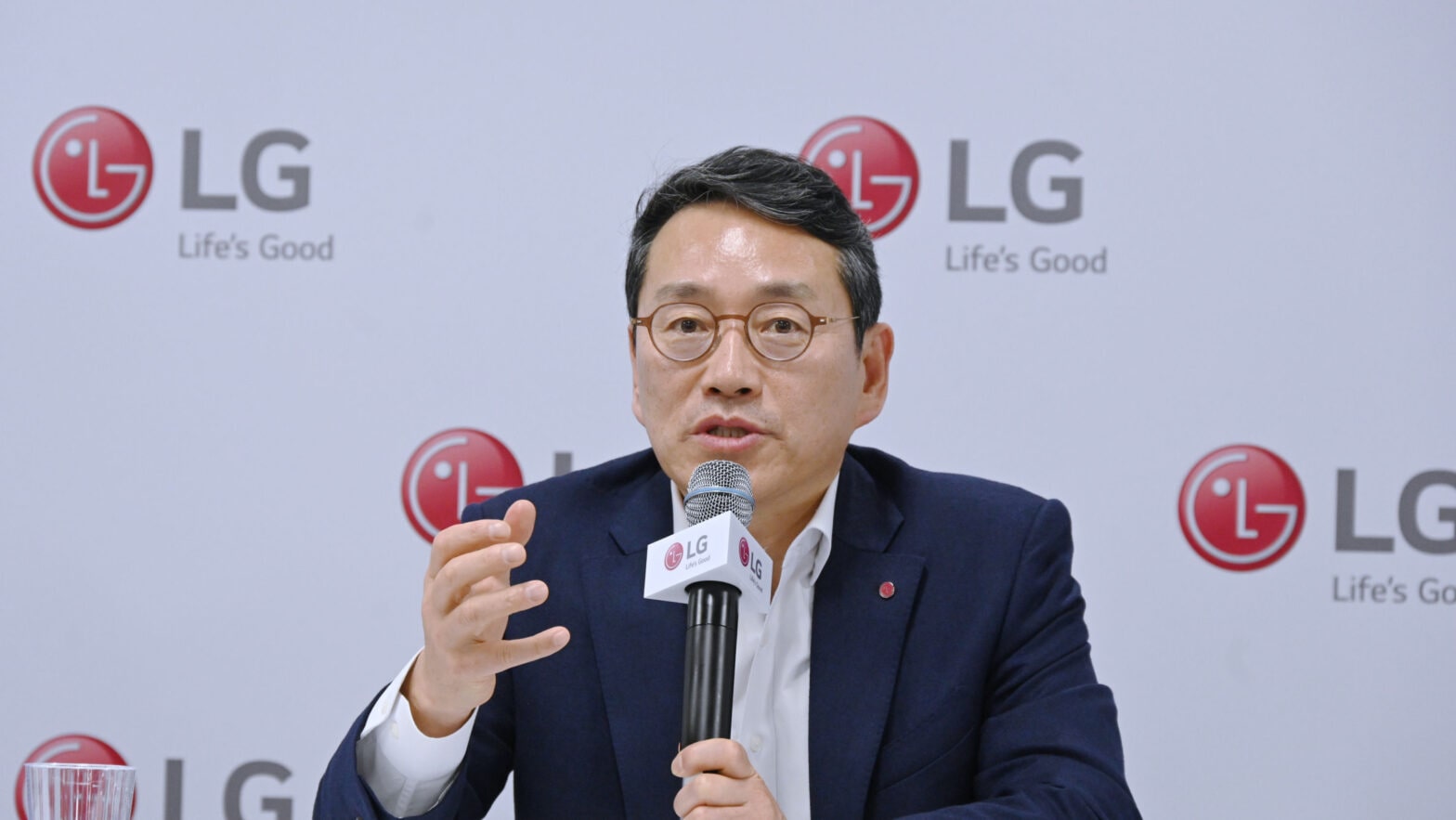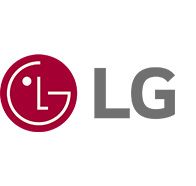Press Release
Corporate
01/08/2023
During Press Conference in Las Vegas, Company Shares Plans to Broaden Business
Portfolio with Platforms, Content and Diverse, New Solutions

LAS VEGAS, Jan. 7, 2022 — LG Electronics’ (LG) CEO William Cho and key executives reiterated the company’s vision for the future as well as its strategy to strengthen business competitiveness during a press conference held especially for Korean media in Las Vegas, Nevada, U.S.A., on January 6.
The CEO began by mentioning that, despite the uncertainty created by the prolonged global economic recession and continuing supply chain instability, opportunities still exist within the current environment. “We will keep pushing forward with our belief that opportunities can always be found by concentrating on how to provide our customers with new experiences and value,” said CEO Cho.
The CEO continued by sharing the company’s main focus in regard to business structure. “We will create a competitive business structure, making targeted improvements rather than focusing on short-term cost reduction,” he stated. “To this end, LG’s existing businesses will overcome current limitations by changing their model and methods, while our new businesses will grow through in-house innovation and the establishment of strategic partnerships.”
Securing Future Growth Engines by Expanding Hardware and Software Solutions Portfolio
During the press conference, company executives talked about plans to expand LG’s hardware-focused business to non-hardware areas, such as software platforms, content, services and solutions. This will enable the company to diversify its overall business portfolio by providing customized services and solutions that can be paired with or offered separately to its innovative consumer electronics products.
LG will further advance its content and services business through the intuitive LG webOS platform, which currently powers more than 180 million LG smart TVs worldwide. From 2018 to 2022, LG’s webOS licensing business grew ten-fold, with more and more TV manufacturers adopting the platform for its ease-of-use, customizability and range of premium services, including LG Channels – the company’s free TV and IP channels service. As of 2022, more than 300 TV brands have chosen webOS, with LG continuously increasing the capabilities and compatibility of its acclaimed smart TV platform. LG is also developing its own interactive content such as LG Fitness, an app that provides access to a wide selection of workout videos, and LG Art Lab, a platform for collecting, trading and displaying non-fungible token (NFT) artworks. Both services were recognized for their innovative design and user experience at the CES 2023 Innovation Award.
Another of LG’s non-hardware offerings, the LG ThinQ™ smart home platform has gone far beyond the mere linking of household devices, evolving to encompass the entire customer journey, with services that leverage the collection of usage data to create a more personalized experience.
In the high-growth arena of electric vehicle (EV) components, the LG Vehicle component Solutions (VS) Company is now delivering meaningful results after 10 years of sustained investment in software development and future-technology preparation. Last year’s order backlog of KRW 80 trillion demonstrates the global competitiveness of the VS Company, which has become a trusted innovation partner to some of the auto industry’s biggest names.
The VS Company is also preparing the launch of its next-generation In-Vehicle Infotainment (IVI) system – a solution that is expected to further boost the performance and reputation of its EV components business.
Moreover, LG is expanding into EV charging solutions, following up its 2022 acquisition of a company specialized in EV chargers with the establishment of a production line at LG Digital Park in Pyeongtaek, South Korea. Furthermore, LG VS is introducing an integrated EV charging solution, as well as developing and producing EV chargers and charging control systems.
LG is also accelerating the development of future core technologies outside of the EV components sector. In particular, LG NOVA (LG North American Innovation Center) is strategically investing in and working with promising technology startups in North America to secure future growth engines in areas such as digital healthcare and the metaverse. In digital healthcare, LG recently launched a remote medical treatment solution developed in partnership with Amwell, a U.S. telemedicine company, while in the metaverse, the company is aiming to expand cooperation with partners to secure core technologies over the mid- to long-term.
Additionally, LG seeks to establish a ‘future technology pipeline’ and strengthen company-wide software competitiveness. Along with accelerating the CTO’s future-ready R&D program, the company is securing top young talent in the field of software development as well as nurturing the software design and coding capabilities of current personnel.
LG is also expanding the customer experience through its company-in-company (CIC) operations, and via collaborations with startups and the sponsoring of innovation contests. A total of five CICs are operating under LG, including the Sprout Company, responsible for the groundbreaking LG tiiun indoor gardening appliance.
Overcoming Limitations and Achieving Consumer-Oriented Performance
LG will be focusing on the user experience even more on 2023, delivering new products and services that provide outstanding convenience and unique value to consumers. Last year, the company introduced a new paradigm in the home appliance industry with the launch of its LG ThinQ™ UP personalized appliances, lifestyle solutions that can evolve to offer more and more value over time. Appliances with ThinQ UP, previously available only in South Korea, will be sold globally from this year, starting in North America.
The company will continue to introduce category-leading, premium home appliances this year, with its 2023 lineup including advanced solutions such as the WashTower and LG refrigerators with MoodUP™. At the same time, the company will enhance its more competitively-priced product lines to solidify its market leadership.
This year, the LG Home Entertainment Company is ramping up changes to its business structure and embracing a new vision: Sync to you, Open to All. The new vision emphasizes the creation of experiences that can be tailored to each customer’s needs, tastes and lifestyle while, at the same time, enjoyed by all users. Presenting differentiated value that can’t be found elsewhere, the company is set to redefine the viewing and user experience by enhancing content and services on the webOS platform. Key features added to webOS for 2023 include a new home screen with a revamped user interface for better, more convenient user experiences; next-level personalization with customized recommendations based on users’ viewing and usage history; and CDX (Cross Device eXperience), a user experience that flows seamlessly from device to device.
Staying on the subject of home entertainment innovation, LG has been the leader of the OLED TV market for an entire decade now, with cumulative shipments of LG OLED TVs exceeding 15 million units. This year, the company will maintain its competitive edge by introducing new OLED evo TVs – adding on to the exciting 2023 lineup that also includes an OLED TV with Zero Connect Box.
Uncovering Customer Value Based on ‘F.U.N.’ Experiences
The company plans to prioritize customer experience (CX) and digital transformation (DX) initiatives to bring more innovation to the customer experience and to create a more customer-centric business model. The company is committed to using data-driven insights to produce new customer value based on the delivery of first, unique and new (or F.U.N.) experiences.
LG is leveraging a variety of data to enhance its offerings and the experiences they provide. These include ‘Trigger’ – data used to develop and design the customer experience; ‘Accelerator’ – data used to map out and implement customer experience innovations; and ‘Tracker’ – data used to monitor the customer experience. The company has already launched products designed based on the above customer data, including the MoodUP™ refrigerator and the 42-inch OLED TV.
LG is also using data to make production more efficient. Utilizing intelligent manufacturing systems based on digital twin technology, AI and big data, the LG Smart Park in Changwon has improved productivity by 20 percent1 while simultaneously reducing product defect costs.2 Additionally, the company’s adoption of DX is being extended to the procurement of raw materials, supply chain management (SCM) and services.
Becoming a Brand that Moves Customers’ Hearts through Endless Innovation
With its brand mission of Innovation for a Better Life, the company remains committed to building a better future for people and the planet. LG is also continuing its efforts to become a brand that resonates with all generations, with products and services that have unique value that speaks to everyone, regardless of demographic. In Korea, the company recently introduced experiential spaces – such as the Gold Star Arcade and ThinQ Room Escape – designed with younger customers in mind and is fostering digital communities for diverse products including LG gram, tiiun and StanbyME.
LG’s commitment to elevating the customer experience is equaled by its dedication to environmental sustainability and accessibility. In terms of sustainability, the company plans to achieve carbon neutrality by 2030 and transition all power sources to renewable energy by 2050. And by 2030, LG aims to have used a total of 60 million tons of recycled plastics in the production of new products. E-waste collection will be expanded as well as the company strives to create a circular economy that minimizes waste and resource consumption.
To provide appliances that are convenient for everyone to use, the company is increasing its focus on accessibility. Various efforts conducted in South Korea include the production of product manuals incorporating sign language and voice instructions, the creation of braille stickers for diverse appliance lineups and a sign language option for customer services.
Within the company itself, CEO Cho will continue his drive to improve communications with employees and build a healthy, inclusive workplace and culture. Mr. Cho held six of his ‘CEO F.U.N. Talks’ in 2022, the sixth of which was used to deliver his year-end address. Throughout the talks, which allowed the CEO to respond to comments and questions from LG personnel in real time, Mr. Cho spoke about the importance of operating with transparency and sincerity, and always putting the customer’s needs first.
LG is currently displaying its latest innovations at the company’s booth (#15501, Las Vegas Convention Center) at CES 2023 in Las Vegas from January 5-8.
# # #
1 Units produced per hour has increased by 20 percent, comparing the figures from the year 2020 to 2021 according to the lighthouse site visit report by World Economic Forum.
2 The cost of defective product returns dropped by 70 percent from 2020 to 2021.


